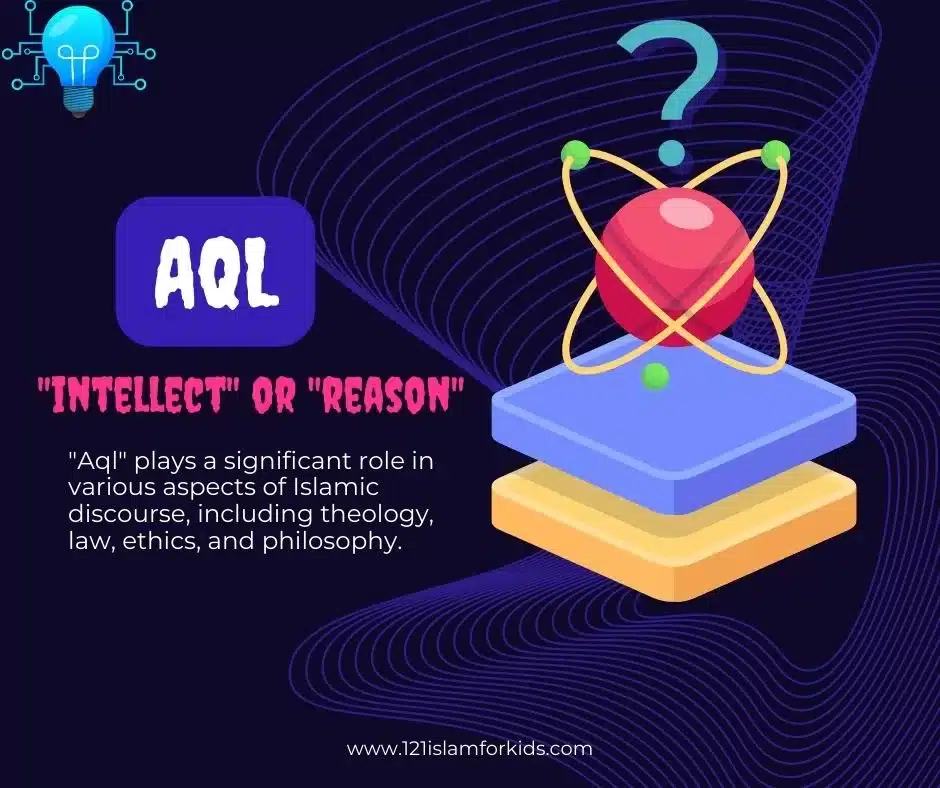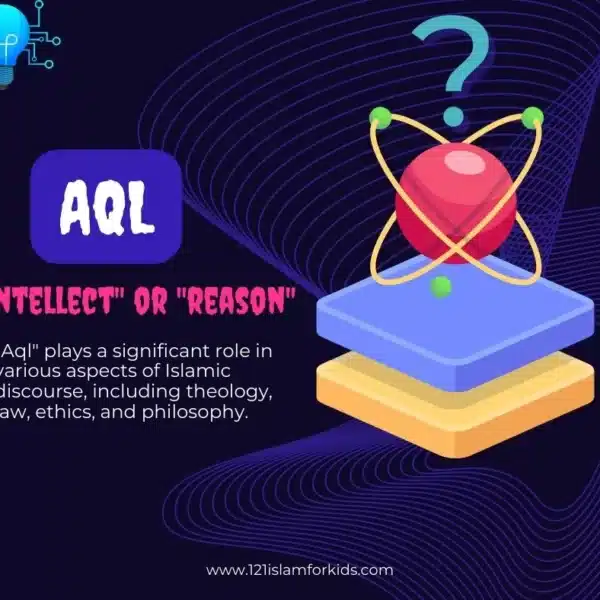Table of Contents
What is AQL?
“Aql” is an Arabic term (Arabic: عقل) that is commonly translated as “intellect” or “reason” in English. In Islamic theology and philosophy, “aql” refers to the faculty of rationality and intellectual capacity that distinguishes human beings from other creatures. It encompasses the ability to think, understand, discern, and make judgments.
In Islamic thought, “aql” is considered a gift from Allah and is highly valued as a means of comprehending and reflecting upon the world, acquiring knowledge, and making sound decisions.
It is seen as a tool to seek truth, understand religious teachings, and fulfill one’s moral and ethical obligations.
“Aql” plays a significant role in various aspects of Islamic discourse, including theology, law, ethics, and philosophy. It is regarded as a source of guidance alongside revelation (Quran) and prophetic teachings (Hadith).
Islamic scholars thought
Islamic scholars emphasize the importance of utilizing one’s intellect to understand and interpret religious teachings in a rational and logical manner.
In Islamic philosophy, philosophers like Ibn Sina (Avicenna) and Al-Farabi further developed the concept of “aql” and explored its relationship with other faculties of the human soul, such as the “nafs” (self) and “ruh” (spirit). They delved into topics like the nature of knowledge, the limits of reason, and the role of intellect in understanding metaphysical concepts.
It is worth noting that while “aql” is highly regarded in Islam, it is seen as complementary to revelation rather than superior to it. Islamic teachings emphasize the balance between reason and faith, with the understanding that certain matters may transcend human intellect and require reliance on divine guidance.
Conclusion
Overall, “aql” represents the capacity for rationality and intellectual discernment in Islam. It is valued as a means of acquiring knowledge, understanding religious teachings, and making informed decisions in accordance with Islamic principles and ethics.
The connection between Wisdom, intellect, and knowledge concepts
Wisdom, intellect, and knowledge are interconnected concepts, each playing a significant role in personal growth and understanding. Here’s an overview of their connection:
Knowledge:
Knowledge refers to the information, facts, and understanding that one acquires through learning, observation, study, and experience. It involves the accumulation of facts, data, theories, and concepts in various domains. Knowledge serves as the foundation upon which wisdom and intellect are built.
Intellect:
Intellect is the capacity for reasoning, critical thinking, and logical analysis. It involves the ability to process and comprehend information, make connections, solve problems, and engage in abstract thinking. Intellect enables individuals to use their cognitive abilities effectively to understand and interpret knowledge.
Wisdom:
Wisdom goes beyond knowledge and intellect. It involves the application of knowledge and the ability to make sound judgments, discernment, and practical understanding. Wisdom incorporates insight, experience, intuition, and moral or ethical considerations. It is the ability to use knowledge and intellect in a way that promotes understanding, empathy, and virtuous action.
In this interconnected relationship, knowledge provides the raw material, intellect processes and interprets that knowledge and wisdom applies that knowledge and intellect to make wise decisions and choices. Wisdom involves understanding the deeper implications and consequences of knowledge and utilizing intellect to discern what is most beneficial and virtuous in a given situation.
In summary, knowledge is the acquisition of information, intellect is the cognitive capacity to process and understand that information, and wisdom is the wise and practical application of knowledge and intellect to navigate life’s challenges and make morally sound decisions. They work together to enhance personal growth, decision-making, and overall understanding of the world.

Some Islamic quotes about wisdom or intellect
- “Wisdom is the lost property of the believer, so wherever he finds it, he has the most right to it.” – Prophet Muhammad (peace be upon him)
- “The most perfect man in his faith among the believers is the one whose behavior is most excellent, and the best of you are those who are the best to their wives.” – Prophet Muhammad (peace be upon him)
- “The wisest among you is the one who knows himself.” – Imam Ali ibn Abi Talib
- “The one who controls his anger and forgives people is the strongest person.” – Prophet Muhammad (peace be upon him)
- “He who has no intellect has no religion.” – Imam Ali ibn Abi Talib
- “The tongue of the wise is behind his heart, and the heart of the fool is behind his tongue.” – Imam Ali ibn Abi Talib
- “The most valuable thing a wise man carries is patience.” – Imam Ali ibn Abi Talib
- “He who understands himself understands his Lord.” – Imam Ali ibn Abi Talib
- “The best form of worship is the pursuit of knowledge.” – Prophet Muhammad (peace be upon him)
- “Wisdom is the adornment of the believer, wherever he finds it, he takes it.” – Imam Ali ibn Abi Talib
These quotes highlight the importance of wisdom, intellect, and self-awareness in Islam. They emphasize the significance of having good character, controlling one’s emotions, seeking knowledge, and understanding oneself as a means of attaining true wisdom and spiritual growth.
Quotes emphasize the importance of knowledge
- “The ink of the scholar is more sacred than the blood of the martyr.” – Prophet Muhammad (peace be upon him)
- “Seek knowledge from the cradle to the grave.” – Prophet Muhammad (peace be upon him)
- “The seeking of knowledge is obligatory for every Muslim.” – Prophet Muhammad (peace be upon him)
- “The superiority of a knowledgeable person over a worshipper is like the superiority of the moon over all other heavenly bodies.” – Imam Ali ibn Abi Talib
- “Acquire knowledge; it enables its possessor to distinguish right from wrong; it lights the way to heaven. It is our friend in the desert, our company in solitude, our companion when friendless. It guides us to happiness; it sustains us in misery; it is an ornament among friends and an armor against enemies.” – Imam Ali ibn Abi Talib
- “Seek knowledge even if you have to go as far as China.” – Prophet Muhammad (peace be upon him)
- “Whoever treads a path in search of knowledge, Allah will make easy for him the path to Paradise.” – Prophet Muhammad (peace be upon him)
- “The ink of scholars and the blood of martyrs are of equal value in the sight of Allah.” – Ibn Majah
- “The most beloved of people to Allah are those who are most beneficial to people.” – Prophet Muhammad (peace be upon him)
- “The best of you are those who learn the Quran and teach it to others.” – Prophet Muhammad (peace be upon him)
These quotes emphasize the importance of knowledge, learning, and intellectual pursuits in Islam. They highlight the value of acquiring knowledge, using intellect (aql) to discern right from wrong, and the significance of scholars in guiding and benefiting society.

Leave a Reply
You must be logged in to post a comment.